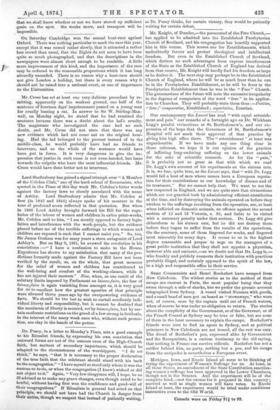Lord Shaftesbury has gained a signal triumph over "A Member
of the Cobden Club," one of the hard school of Economists, who quoted in the Times of this day week Mr. Cobden's bitter words against the factory laws so closely associated with the name of Ashley. Lord Shaftesbury admits that Mr. Cobden at first (in 1843 and 1844) always spoke of his measure in the tone of profound acorn reflected in that quotation. But when in 1846 Lord Ashley brought forward his Bill for the regu- lation of the labour of women and children in calico print-works, Mr. Cobden said to him, "I am stoutly opposed to factory legis- lation and interference with the work-people, but the evidence placed before me of the terrible sufferings to which women and -children are exposed is such that I cannot resist you." So, too, Sir James Graham was for many years a stern antagonist of Lord Ashley's. But on May 9, 1861, he avowed the revolution in his convictions :—" I have a confession to make to the House. Experience has shown to my satisfaction that many of the pre- dictions formerly made against the Factory Bill have not been -verified by the result, as, on the whole, that great measure for the relief of women and children has contributed to the well-being and comfort of the working-classes, while it has not injured their masters." Now, when, as one result of the salutary limits imposed by Parliament on laissez-faire, the fear of iaieeex-faire is again vanishing from amongst us, it is very good for us to recollect how the greatest apostles of that principle were silenced thirty years ago by the overpowering evidence of facts. We should be the kat to wish to curtail needlessly indi- vidual liberty and responsibility, but it cannot be doubted that the maximum of liberty is secured, not by laissez-faire, but by cer- tain moderate restrictions on the greed of a few strong in lividuals, in the interest of the many weak ones who, without such protec- tion, are clay in the hands of the potter.


































 Previous page
Previous page